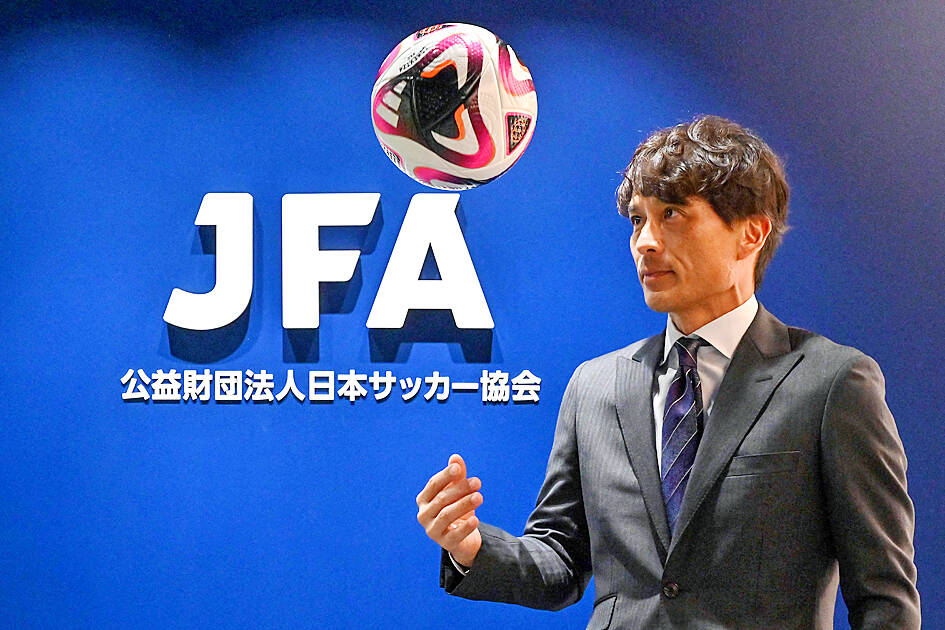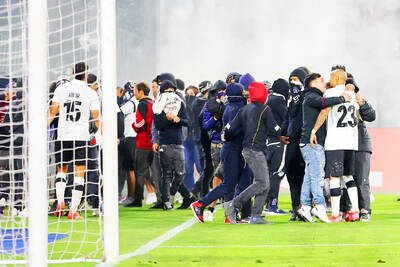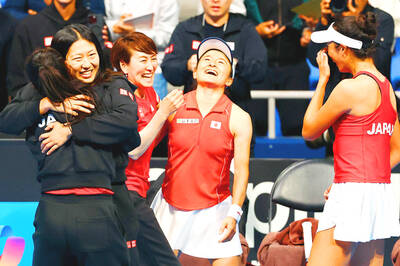Japan wants to host the FIFA Women’s World Cup in 2031 to ignite the domestic game and cut the gap on Europe and North America, the country’s soccer chief told reporters on Monday.
In 2011 Japan won the competition, but they have since been overtaken, with women’s soccer booming in Europe in the past few years.
“We would like to raise the value of women’s football here,” Japan Football Association president Tsuneyasu Miyamoto said in an interview at the association’s headquarters in Tokyo, in front of a giant photograph of Japan’s World Cup-winning team.

Photo: AFP
Miyamoto was captain of the Japan men’s team when they cohosted the World Cup with South Korea in 2002, a tournament that helped spark huge interest in soccer among the Japanese public.
Now 47, he took over as head of the association this year and has similar hopes for the 2031 Women’s World Cup. The country has never hosted the event.
However, Japan is likely to face stiff competition for hosting rights, with a joint bid from the US and Mexico expected. England and China are also reportedly interested.
“We have the WE League, and it has been struggling to gather an audience,” Miyamoto said. “We would like to increase the number of women players here.”
The professional women’s WE League launched in 2021, but it has failed to attract anything like the attendances and revenue enjoyed by women’s leagues in Europe and the US.
Japan’s women have not gone beyond the quarter-finals at a world cup since they lost to the US in the 2015 final.
Miyamoto said that Japan “could have done better” to capitalize on the 2011 triumph, which triggered massive interest in women’s soccer before it quickly fizzled out.
The former defender wants Japan to develop a more passionate soccer culture, saying that his stint with Austrian side Red Bull Salzburg “inspired me a lot.”
“They have their own culture, they have football in their daily lives,” he said.
“We haven’t built that kind of community here in Japan. I’d like to make football our culture in Japan,” he added.
Miyamoto played 71 times for his country, captaining the side at the 2002 and 2006 world cups.
He spent most of his career in the domestic J. League, at a time when only a few Japan internationals played for European clubs.
Japanese players are now all over Europe and the national team has benefitted as a result, regularly appearing in the World Cup knockout rounds.
“It’s very normal for them to play in the Champions League,” Miyamoto said of the current generation of players. “When facing big teams like Germany or Spain ... they have no fear.”
The steady stream of players to Europe has helped Japan’s national team, but also posed problems for J. League clubs.
Miyamoto said that they need to keep producing talent, but argues that “transfer fees for Japanese players are low compared to players from South America.”
Brighton & Hove Albion paid just £2.5 million (US$3.24 million) to sign winger Kaoru Mitoma in 2021, while prolific scorer Kyogo Furuhashi joined Celtic for £4.5 million the same year.
“In Europe clubs are very strong, but in Japan clubs are not that strong,” Miyamoto said. “Players who only have six months left on their contract are still playing in official matches. After the season, they will be free to go anywhere, and in that case, clubs can’t get any money.”
Miyamoto wants to bring a new way of thinking to Japanese soccer.
He is a graduate of the FIFA Master sports executive program and also had a stint coaching J. League side Gamba Osaka.
He is the first Japan Football Association president to have played at a World Cup and the youngest since the end of World War II.
“Former players, especially players who played at a high level, know how the football world works,” Miyamoto said. “Forty-seven is not young as a person. Talking about leaders of national organizations, maybe 47 is young. Maybe a new generation might be able to bring something new into this world.”

Two people died on Thursday after fans and police clashed outside the Estadio Monumental in Santiago ahead of a game in South America’s Copa Libertadores, Chilean authorities said. The fatalities happened shortly before the match between Chile’s Colo-Colo and Brazilian club Fortaleza, when police blocked about 100 fans when they attempted to enter the stadium. There were conflicting accounts of how the fatalities occurred, with local media reporting that one of the dead was a 13-year-old boy. The other victim was an 18-year-old woman, according to a relative at the hospital where she was treated. The fans died after being caught underneath a

College basketballer Kaitlyn Chen has become the first female player of Taiwanese descent to be drafted by a WNBA team, after the Golden State Valkyries selected her in the third and final round of the league’s draft on Monday. Chen, a point guard who played her first three seasons in college for Princeton University, transferred to the University of Connecticut (UConn) for her final season, which culminated in a national championship earlier this month. While at Princeton, Chen was named the Ivy League tournament’s most outstanding player three times from 2022 to last year. Prior to the draft, ESPN described Chen as

College basketballer Kaitlyn Chen (陳凱玲) has become the first player of Taiwanese descent to be drafted by a WNBA team, after being selected by the Golden State Valkyries in the third and final round of the league's draft yesterday. Chen, a point guard who played her first three seasons in college for Princeton University, transferred to the University of Connecticut (UConn) for her final season, which culminated in a national championship on April 6. While at Princeton, Chen was named the Ivy League tournament's most outstanding player three times from 2022 to last year. Prior to the draft, ESPN described Chen as a

Japan yesterday secured a second consecutive Billie Jean King Cup finals appearance with a 2-1 win over 2023 champions Canada, thanks to Ena Shibahara and Shuko Aoyama’s 6-3, 5-7, 6-2 win over Kayla Cross and Rebecca Marino in the qualifying doubles decider. Shibahara and Aoyama powered through the opening set 6-3, breaking twice for a quick 3-0 lead. Cross and Marino hit back in the second, edging it 7-5 to level the match, before the Japanese pair regained control in the third. Canada’s 18-year-old Victoria Mboko edged Shibahara 6-4, 6-7 (8/10), 7-5 in a marathon opening clash. Mboko fired eight aces to